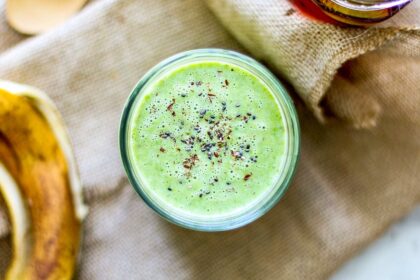We’ve all experienced that unfortunate moment when a seemingly satisfying meal quickly turns into feeling hungrier than you were before. It’s as if the food we just consumed had a fleeting effect, leaving us craving more despite having just eaten.
While food choices play a crucial role in our overall well-being, not all options are created equal when it comes to satiety. In our pursuit of a balanced diet, it’s essential to steer clear of foods that can unexpectedly leave us feeling hungrier than before we picked up our fork.
In this article, we delve into seven common culprits that might sabotage our efforts to feel full and content after a meal. Understanding the impact of these hunger-inducing foods can empower us to make more mindful choices and ultimately achieve greater satisfaction from our meals.
The Science of Why Your Feeling Hungrier After Eating
Some foods can leave you feeling hungrier than before you ate them due to their impact on your body’s hormones, blood sugar levels, and satiety signals. Here are a few reasons why this might happen:
- High Glycemic Index Foods: Foods with a high glycemic index (GI) cause a rapid spike in blood sugar levels, followed by a crash. This can lead to a cycle of feeling hungry shortly after eating because the quick rise and fall in blood sugar levels can trigger hunger hormones like ghrelin. Supplements Like CoQ10 Can Help Balance Your Blood Sugar Naturally. Click Here To Check Out Micro Ingredients CoQ10!
- Low Fiber Content: Foods that are low in dietary fiber may not provide a feeling of fullness for very long. Fiber-rich foods take longer to digest, promoting a slower release of nutrients and a more sustained feeling of satiety. When you eat foods low in fiber, you might feel hungry again sooner. Adding High Quality Fiber To Your Diet Can Help You Stay Feeling Fuller For Longer! Check Out Micro Ingredients Fiber Powder Here!
- Lack of Protein: Protein is known to promote feelings of fullness and satisfaction. Meals or snacks that are low in protein might not keep you satisfied for long, leading to hunger shortly after eating. Including lean sources of protein in your meals can help reduce post-meal hunger. This High Quality Pea Protein Powder From Micro Ingredients Is Easy To Digest And A Great Addition To Your Daily Regimen! Click Here To Check It Out!
- Highly Processed Foods: Highly processed foods, which are often high in refined sugars, unhealthy fats, and additives, can disrupt the body’s natural hunger and satiety signals. These foods can lead to over-consumption and increased cravings, leaving you feeling hungrier after consumption.
- Lack of Nutrient Density: Foods that are lacking in essential nutrients, vitamins, and minerals might not provide your body with the nourishment it needs. As a result, your body may continue to signal hunger in an attempt to obtain the missing nutrients. Check Out These High Quality Vitamins & Minerals To Fill In The Nutritional Gaps Of Your Diet! Click Here To Learn More!
- Emotional Eating: Sometimes, the feeling of hunger after eating certain foods might not be due to physical hunger but rather emotional triggers. Consuming comfort foods or stress eating can lead to feelings of guilt or dissatisfaction after eating, causing you to perceive hunger even when your body is not truly in need of more food.
- Imbalanced Meals: Meals that lack balance in terms of macronutrients (carbohydrates, proteins, and fats) might not provide sustained energy or satiety. For instance, a meal that’s primarily composed of carbohydrates without enough protein and healthy fats might lead to a quick spike and crash in energy levels, making you feel hungry again soon.
- Mindless Eating: Eating quickly without paying attention to your body’s cues can lead to overeating. It takes some time for your body to signal that it’s full, so if you eat too quickly, you might not realize you’re satisfied until after you’ve consumed more than you need.
To avoid feeling hungrier after eating, focus on consuming balanced meals that include a variety of nutrient-dense foods. Prioritize whole foods, such as fruits, vegetables, whole grains, lean proteins, and healthy fats.
Pay attention to your body’s hunger and fullness cues and eat mindfully to give your body time to register satiety. If you consistently find that certain foods leave you feeling hungrier, it might be beneficial to adjust your diet and food choices accordingly.
The Foods That Make You Hungrier
- White Bread – There are a couple of reasons why consuming white bread is a complete no-no when you are hungry. First, white bread is made from refined flour which is devoid of some of the most important parts of grains, which are the bran and germ. Second, nutrition experts say that white bread can make your sugar levels spike, and this is a total nightmare because it will only leave you feeling so hungry once they drop.
- White Pasta – Just like white bread, white pasta is something that can increase your hunger when you consume it because it’s made from refined flour and it can cause spikes in your blood sugar levels. There is one thing more that makes pasta a dreadful choice whenever you’re feeling hungry: the unhealthy sauce that it is commonly slathered with. As a general rule of thumb, steer clear of anything white if you don’t want to end up hungrier than when you started eating.
- Cheese – Speaking of unhealthy pasta sauce, cheese is another thing that you should steer clear of if you don’t want your hunger to go through the roof. According to scientists, certain protein compounds in cheese can make you crave more and more of it. In addition, cheese contains fat and sodium, both of which can wreak havoc on your figure. To be on the safe side, don’t just evade cheese, but also other food products that contain milk.
- Salty Treats – If you think that snacking on a handful of chips or pretzels can make your hunger go away, better think again. Nutrition experts say that foods that are high in sodium will satisfy your craving for something salty, but not something sweet. So naturally after finishing off a serving of your favorite salty treat, it’s very much likely for you to look for something laden with sugar. Besides, most salty snacks are made from refined flour, which is a complete appetite booster.
- Chinese Food – While it’s true that a lot of Chinese foods contain good amounts of vegetables, which are heavy on the stomach, the truth is consuming them can leave you feeling hungrier than before. The reason for this is because Chinese foods tend to be loaded with monosodium glutamate or MSG, something that can dramatically increase appetite. It’s no wonder why studies have shown that people who ate the most MSG-rich foods tend to be heavier than those who didn’t.
- Low-Fat or Fat-Free Anything – Most people who are trying to drop excess pounds opt for food products that are low in fat or completely devoid of it. However, this is actually a very bad idea because the absence of fat can make eating a less stomach-satisfying experience, causing you to crave other foods that are more fulfilling. Besides, fat also makes food pleasing to the taste buds, and that’s why its absence can make your mouth long for anything that tastes so much better.
- Sugar-Free Drinks – Consuming beverages that are artificially sweetened should be perfectly fine because they contain no sugar, right? Wrong, say the experts. Each time you gulp down something that has an artificial sweetener in it, your brain prepares your body for the loads of sugar that will flood your system. When no sugar is detected, it will cause you to crave anything that actually has sugar in it. Artificial sweeteners are also known to interfere with the brain’s hunger control centers.
Making wise choices when hunger strikes can have a significant impact on achieving and maintaining a healthy weight. By avoiding these hunger-inducing foods, you’ll be on your way to feeling fuller and more satisfied after each meal, making it easier to stick to your nutritional goals.
In Conclusion
In a world where our choices determine not only our health but also our well-being, understanding the science behind satiety is an essential step toward making smarter decisions about what we put on our plates. As we navigate the intricate landscape of hunger and satisfaction, it’s clear that certain foods can play tricks on our senses, leaving us hungrier than before.
Steering clear of these seven culprits can empower us to take control of our cravings and achieve a more harmonious relationship with food. Remember, the goal is not to deprive ourselves but to nourish and nurture our bodies with foods that genuinely fuel and satisfy.
By embracing fresh fruits and veggies, lean proteins, fermented foods and drinks, legumes and grains, we can pave the way to a healthier, more satisfying lifestyle. Making informed choices and practicing mindful eating are crucial steps toward redefining our perception of fullness and hunger.
So, the next time you find yourself reaching for a quick fix, consider the long-term impact on your appetite and well-being. Your body will thank you for nourishing it in ways that leave you feeling truly satisfied, making those persistent cravings a thing of the past.





